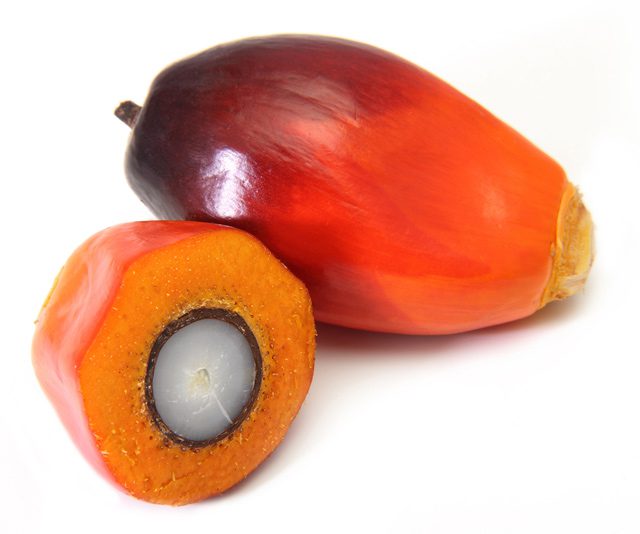By Yoga Rusmana, Eko Listiyorini and Ranjeetha Pakiam
Sept. 26 (Bloomberg) — The world’s two biggest palm oil producers cut export taxes on most shipments to zero, seeking to lure buyers amid a global glut in edible oils that sent prices to a five-year low.
Crude shipments of the most-used cooking oil from Indonesia will not attract any tariff in October, down from 9 percent this month, said Bayu Krisnamurthi, the deputy trade minister. It’s the first time since December 2009 that the rate has been zero in Indonesia, the biggest producer, data compiled by Bloomberg show. Malaysia, the second-largest, earlier this month made exports tax-free for two months through October.
Excess supply of cooking oil amid bumper crops of U.S. soybeans and unprecedented palm oil output from Southeast Asia has helped cut global food costs to the lowest since 2010. Tax cuts by Indonesia and Malaysia, which account for 86 percent of world’s production of the oil used in everything from noodles to cosmetics, may further reduce prices as they compete for customers and seek to prevent a build-up in stockpiles.
“There’s plenty of stock of vegetable oils more broadly around the world and these prices are going to have to trade against each other in the relative sense to effectively buy demand away from the other oils,” Wayne Gordon, a commodity analyst at UBS AG in Singapore, said by phone today. “In many ways palm oil is hitting against the threshold of where it’s mostly competitive against other vegetable oils.”
Food Prices
Palm futures slumped to 1,914 ringgit ($588) a metric ton on Sept. 2 on the Bursa Malaysia Derivatives, the lowest since March 2009. While they have since rebounded to 2,185 ringgit, they are still down 18 percent this year.
Cheaper supplies may benefit buyers including India and China. Palm oil imports by India will climb to a record 9 million tons in the year to Oct. 31 as lower prices and zero-tax on exports make the oil attractive to refiners, according to Ruchi Soya Industries Ltd., the nation’s biggest refiner.
Food prices fell to the lowest in almost four years in August as costs of cooking oils tumbled with milk and cheese, the United Nations’ Rome-based Food & Agriculture Organization said Sept. 11. An index of 55 food items dropped 3.6 percent to the lowest since September 2010, according to the FAO. The vegetable-oil index slipped to 166.6 points from 181.1 points amid an improved outlook for palm-oil production in Southeast Asia and lower-than-forecast import demand from China and India.
Indonesian Formula
World production of 10 major oilseeds is forecast to climb 4.3 percent in 2014-2015 to a record, with the outlook for soybeans raised on increased estimates for the U.S. and Brazil, according to Oil World. Oilseed output may rise to 519.7 million tons from 498.2 million tons in 2013-14, the Hamburg-based researcher wrote in an e-mailed report.
Indonesia sets the monthly export tariff according to a formula based on average prices in Jakarta, Rotterdam and Kuala Lumpur. Crude shipments attract no tax if the average rate is $750 or less over a four-week period, with rates escalating from 7.5 percent to 22.5 percent at higher average prices.
In addition to crude exports, shipments of 27 palm products including olein will also not be taxed next month, while palm kernel and palm cake will attract tariffs of 40 percent and 20 percent, according to a table published by the Finance Ministry.
“I call on the palm oil exporters to manage shipments and not to increase them just because the tax is zero percent,” Krisnamurthi said. “Demand is weak and if we boost supply, it will put pressure on prices.”
Malaysian Decision
Malaysia’s Ministry of Plantation Industries and Commodities said on Sept. 4 that crude palm oil exports in September and October will not attract a levy, after the government earlier set the tax at 4.5 percent for September. The government will assess whether the decision should be extended and is in talks with the industry, according to Plantation Industries and Commodities Minister Douglas Uggah Embas.
The exemption will increase Malaysian exports while helping to contain stockpiles at 1.6 million tons by year-end, according to the plantation ministry. Prices would have extended losses in the absence of measures, it said.
Malaysia’s shipments rose 30 percent to 1.28 million tons in the first 25 days of this month from a month earlier, according to an estimate from Intertek. Malaysian inventories in August expanded 22 percent to 2.05 million tons, the highest since March 2013, data from the country’s palm board show.
Palm oil exports from Indonesia fell 6.4 percent to 1.72 million tons in August from July, the country’s Palm Oil Association said on Sept. 22. The country doesn’t release data for stockpiles.
“There’s a likelihood that Malaysia may find a bit more competition from Indonesia next month,” Ivy Ng, an analyst at CIMB Investment Bank Bhd., said by phone in Kuala Lumpur before the tax change was announced. “You’ll see more exports out of Indonesia.”
Copyright 2014 Bloomberg.

 Join The Club
Join The Club











